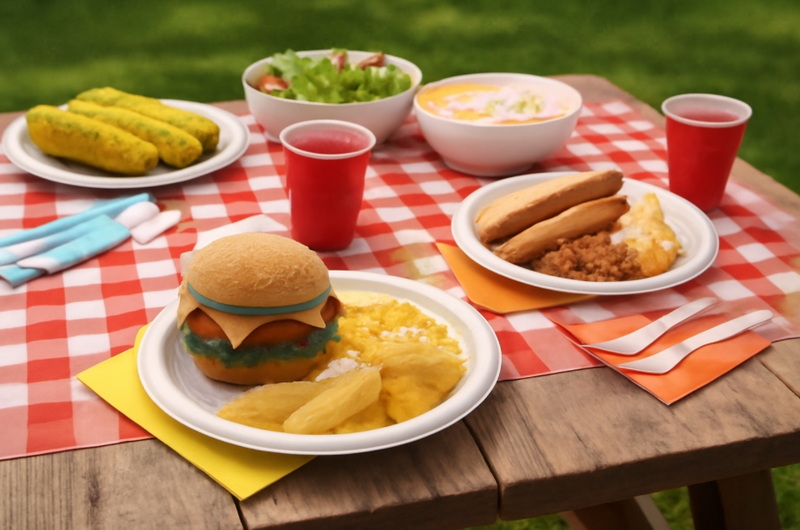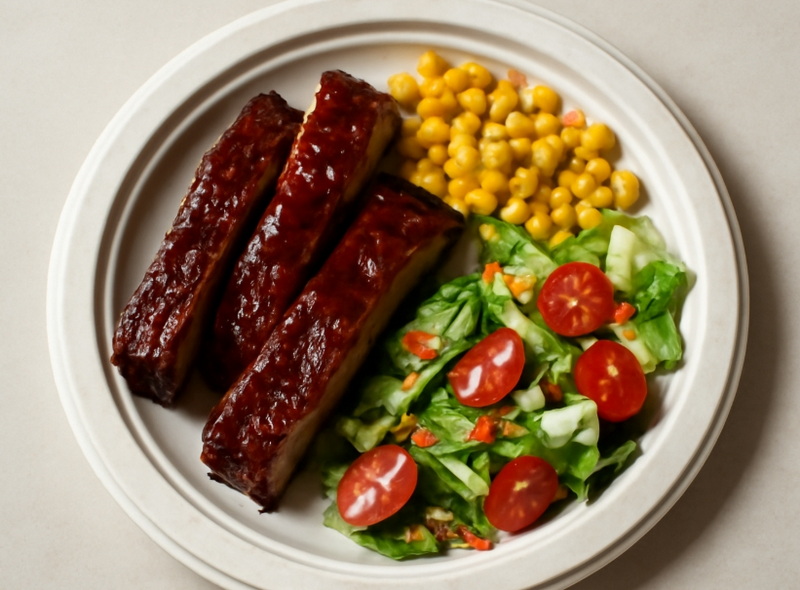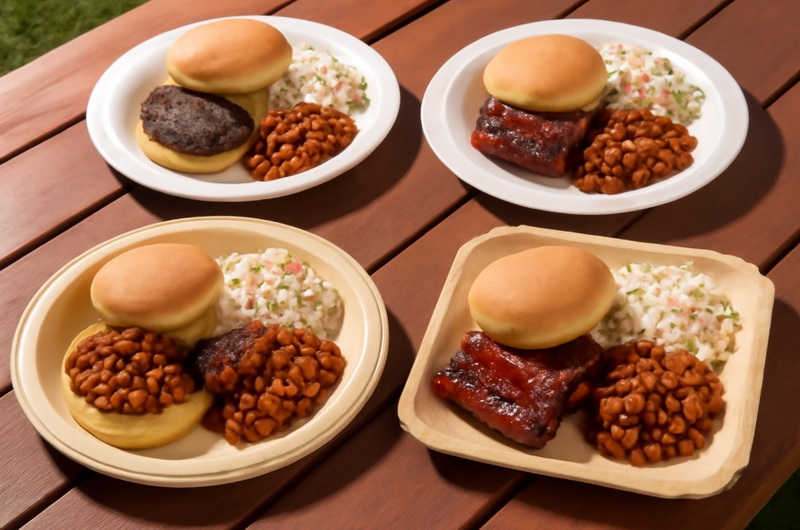
Content Menu
● Introduction to Disposable Plate Manufacturers And Suppliers in France
● Why Choose Disposable Plates?
>> Convenience
>> Hygiene
>> Versatility
>> Eco-Friendly Solutions
● Top Disposable Plate Manufacturers And Suppliers in France
>> Platex
>> STIPAC
>> Le Nappage
>> Ecodyne Tableware (Conservia)
>> Fetez-Moi
>> Guillin
>> Marcojea Production
>> Melitta France
>> FLO Europe SAS
>> Espirit Planete & Prosaveurs
● How Disposable Plates Are Made: Manufacturing Process
>> Paper Plate Manufacturing
>> Palm Leaf Plate Manufacturing
>> Melamine Plate Manufacturing
● Key Trends Among Disposable Plate Manufacturers And Suppliers in France
>> Eco-Friendly Materials
>> Customization and Branding
>> Regulatory Compliance
>> Innovation in Design and Functionality
>> Bulk Ordering and OEM Services
● Comparison Table: Leading French Disposable Plate Manufacturers
● How to Choose the Right Disposable Plate Manufacturer or Supplier
● Conclusion
● Frequently Asked Questions
>> 1. What materials are commonly used by disposable plate manufacturers and suppliers in France?
>> 2. Are there eco-friendly disposable plate manufacturers and suppliers in France?
>> 3. Can I order customized disposable plates from French suppliers?
>> 4. What certifications should I look for when choosing a disposable plate supplier in France?
>> 5. How do I choose the right disposable plate manufacturer or supplier in France?
Disposable plates have become an essential part of modern foodservice, catering, and hospitality industries. In France, a country celebrated for its culinary tradition and environmental awareness, the demand for high-quality disposable plates continues to grow. This article explores the leading disposable plate manufacturers and suppliers in France, their product offerings, sustainability efforts, and how they are meeting the needs of both local and international clients. Whether you are a brand owner, wholesaler, or producer seeking OEM services, understanding the French market for disposable plates is crucial for making informed sourcing decisions.

Introduction to Disposable Plate Manufacturers And Suppliers in France
Disposable plates are widely used in various settings, including restaurants, cafes, catering companies, outdoor events, and private gatherings. Their popularity stems from the convenience they offer—eliminating the need for washing, reducing labor costs, and ensuring food safety. In France, the market for disposable plate manufacturers and suppliers is both diverse and innovative, catering to a wide range of customer requirements, from traditional plastic and paper plates to cutting-edge biodegradable and compostable options.
Why Choose Disposable Plates?
Convenience
Disposable plates simplify operations for foodservice providers and event organizers. They save time on cleaning and are easy to transport and store, making them ideal for large gatherings, outdoor events, and fast-paced foodservice environments.
Hygiene
Single-use plates help prevent cross-contamination, which is especially important in the food industry. They are individually packaged and designed for one-time use, ensuring the highest standards of hygiene.
Versatility
Disposable plates come in a variety of shapes, sizes, colors, and materials. This versatility allows manufacturers and suppliers to cater to different occasions, from casual picnics to upscale corporate events.
Eco-Friendly Solutions
With increasing environmental awareness, many disposable plate manufacturers and suppliers in France are investing in the development of biodegradable, compostable, and recyclable products. This shift is supported by both consumer demand and government regulations aimed at reducing single-use plastic waste.
Top Disposable Plate Manufacturers And Suppliers in France
France boasts a robust network of disposable plate manufacturers and suppliers, each offering unique products and services. Below are some of the most prominent companies in the industry:
Platex
Overview:
Founded in 1950, Platex is one of France's most established disposable tableware manufacturers. The company is known for its high-quality disposable plates and extensive range of tableware products, serving industries such as catering, hospitality, and airlines.
Strengths:
- Wide selection of disposable plates and cutlery.
- Focus on functionality, aesthetics, and eco-friendly materials.
- Strong reputation for quality and innovation.
Sustainability:
Platex is committed to environmental responsibility, using recyclable and biodegradable materials wherever possible and adhering to strict production standards.
STIPAC
Overview:
STIPAC, based in La Chapelle-Saint-Luc, specializes in customized disposable products for catering, foodservice, and medical sectors. With over 25 years of experience, STIPAC is a leader in high-quality, personalized disposable tableware.
Strengths:
- Custom printing and design services.
- Large-scale production capabilities.
- Certified for food contact and biodegradable products.
Sustainability:
STIPAC operates under a stringent environmental management policy, optimizing material usage and minimizing waste.
Le Nappage
Overview:
Le Nappage is known for its vibrant and coordinated disposable tableware, including plates, cups, and cutlery. Their products are made in France and are popular for events due to their wide range of colors and designs.
Strengths:
- Extensive color and design options.
- Products designed for seamless coordination with other tableware.
- Focus on aesthetics and quality.
Sustainability:
Le Nappage emphasizes the use of eco-friendly materials and processes, ensuring their products are both attractive and environmentally responsible.
Ecodyne Tableware (Conservia)
Overview:
Ecodyne Tableware is a leading supplier of palm leaf disposable plates in France. Their products are 100% natural, organic, biodegradable, and compostable, catering to the growing demand for sustainable tableware.
Strengths:
- Plates made from fallen areca palm leaves.
- Microwave safe, food safe, and chemical-free.
- Bulk orders for restaurants, catering, and personal use.
Sustainability:
Ecodyne Tableware is fully committed to sustainability, offering products that help reduce plastic waste and are fully compostable.
Fetez-Moi
Overview:
Fetez-Moi is a well-known supplier of disposable tableware for parties and events, offering a variety of plates and themed supplies.
Strengths:
- Wide range of party-themed disposable plates.
- Customizable options for events and celebrations.
Sustainability:
While Fetez-Moi offers some eco-friendly options, their primary focus is on event customization and variety.
Guillin
Overview:
Guillin is a major player in the French and European disposable tableware market, focusing on food packaging and disposable plates for the food processing industry.
Strengths:
- Innovative packaging solutions.
- High-volume production for the food industry.
- Strong distribution network across Europe.
Sustainability:
Guillin invests in research and development to create more sustainable packaging and tableware solutions.
Marcojea Production
Overview:
Marcojea Production specializes in disposable tableware for catering and hospitality, offering a broad range of products tailored for professional use.
Strengths:
- Customization and branding options.
- Strong presence in the French catering sector.
Sustainability:
Marcojea Production is dedicated to using sustainable materials and processes.
Melitta France
Overview:
Melitta France is recognized for its high-quality disposable tableware, particularly in the foodservice and hospitality industries.
Strengths:
- Emphasis on hygiene and food safety.
- Reliable supply and distribution network.
Sustainability:
Melitta France ensures its products meet food safety and environmental standards.
FLO Europe SAS
Overview:
FLO Europe SAS offers a range of disposable tableware products, with a focus on innovation and sustainability.
Strengths:
- European-wide distribution.
- Commitment to eco-friendly materials.
Sustainability:
FLO Europe SAS is dedicated to reducing environmental impact through sustainable product development.
Espirit Planete & Prosaveurs
Both Espirit Planete and Prosaveurs are recognized for their eco-friendly disposable tableware solutions, emphasizing biodegradable and compostable options for the French market.

How Disposable Plates Are Made: Manufacturing Process
Understanding the manufacturing process of disposable plates helps buyers appreciate the quality and innovation behind these products.
Paper Plate Manufacturing
1. Raw Material Preparation:
High-quality paper sheets, often laminated or printed, are prepared for production.
2. Forming:
The sheets are placed in machines with heated dies that press the paper into the desired plate shapes.
3. Trimming and Quality Control:
Edges are trimmed for uniformity, and plates are inspected for defects.
4. Packaging:
Finished plates are stacked and packaged for distribution.
Palm Leaf Plate Manufacturing
1. Collection:
Fallen areca palm leaves are collected and thoroughly cleaned.
2. Pressing:
The leaves are pressed into plate molds using heat and pressure, forming sturdy, natural plates.
3. Finishing:
Plates are trimmed, inspected, and packed for sale.
Melamine Plate Manufacturing
1. Resin Preparation:
Melamine resin powder is measured and placed into molds.
2. Molding:
The powder is heated and pressed to form durable plates.
3. Finishing:
Plates are ground, polished, and packaged.
Key Trends Among Disposable Plate Manufacturers And Suppliers in France
Eco-Friendly Materials
The shift toward biodegradable and compostable materials is one of the most significant trends in the French disposable plate market. Manufacturers are increasingly using palm leaf, sugarcane, and recycled paper to produce plates that are both functional and environmentally responsible.
Customization and Branding
With the rise of private events and corporate branding, more disposable plate manufacturers and suppliers in France offer custom printing and design services. This allows businesses to reinforce their brand identity and create memorable experiences for their customers.
Regulatory Compliance
French manufacturers comply with strict food safety and environmental regulations. These standards ensure that disposable plates are safe for food contact and that their production processes minimize environmental impact.
Innovation in Design and Functionality
Manufacturers are focusing on improving the design and functionality of disposable plates. This includes creating plates that are more durable, heat-resistant, and aesthetically pleasing, as well as developing new shapes and sizes to meet diverse customer needs.
Bulk Ordering and OEM Services
Many French disposable plate manufacturers and suppliers offer OEM services, allowing foreign brands, wholesalers, and producers to source customized products in large quantities. This is especially beneficial for international clients seeking reliable partners for their private label or branded tableware lines.
Comparison Table: Leading French Disposable Plate Manufacturers
| Manufacturer | Main Products | Strengths | Sustainability Focus |
| Platex | Plates, cutlery | Experience, innovation | Yes |
| STIPAC | Custom plates, napkins | Customization, large-scale | Yes |
| Le Nappage | Plates, cups, cutlery | Color variety, design | Yes |
| Ecodyne Tableware | Palm leaf plates | 100% biodegradable, eco-friendly | Yes |
| Fetez-Moi | Party plates | Event customization | Limited |
| Guillin | Plates, packaging | Food industry focus | Yes |
| Marcojea Production | Plates, tableware | Catering sector expertise | Yes |
| Melitta France | Plates, cups | Hygiene, food safety | Yes |
| FLO Europe SAS | Plates, trays, cutlery | European reach, innovation | Yes |
How to Choose the Right Disposable Plate Manufacturer or Supplier
Selecting the best disposable plate manufacturer or supplier in France involves considering several key factors:
- Product Range: Look for suppliers that offer a variety of plate materials, sizes, and designs to suit your needs.
- Material Quality: Ensure the plates are made from high-quality, food-safe materials.
- Customization Options: If you need branded or custom-designed plates, choose a supplier with strong customization capabilities.
- Sustainability Practices: Opt for manufacturers committed to using eco-friendly materials and sustainable production processes.
- Certifications: Verify that the supplier holds relevant certifications for food safety and environmental standards.
- Reputation: Research customer reviews and ask for references to assess the supplier's reliability and service quality.
- Sample Orders: Request samples to evaluate product quality before placing a bulk order.
Conclusion
France is home to a diverse and innovative community of disposable plate manufacturers and suppliers. From established names like Platex and STIPAC to eco-pioneers like Ecodyne Tableware, buyers have a wealth of options for sourcing high-quality, sustainable disposable plates. As environmental considerations become increasingly important, French manufacturers are leading the way in offering biodegradable and compostable solutions for the foodservice and hospitality industries. Whether you are looking for traditional paper or plastic plates, or cutting-edge eco-friendly alternatives, the French market has suppliers ready to meet your needs with quality, customization, and reliability.

Frequently Asked Questions
1. What materials are commonly used by disposable plate manufacturers and suppliers in France?
Disposable plate manufacturers and suppliers in France use a variety of materials, including paper, plastic, palm leaf, sugarcane, and melamine. Eco-friendly options like palm leaf and biodegradable paper are increasingly popular due to environmental regulations and consumer demand.
2. Are there eco-friendly disposable plate manufacturers and suppliers in France?
Yes, several manufacturers such as Ecodyne Tableware, Platex, and STIPAC focus on biodegradable and compostable plates, using materials like palm leaves and recycled paper to minimize environmental impact.
3. Can I order customized disposable plates from French suppliers?
Many suppliers, including STIPAC and Marcojea Production, offer customization options such as printing logos, colors, and event themes on disposable plates, making them ideal for branding and special occasions.
4. What certifications should I look for when choosing a disposable plate supplier in France?
Look for certifications related to food safety (such as food contact certification), biodegradability, and environmental management. Compliance with EU environmental standards is also important for ensuring product quality and safety.
5. How do I choose the right disposable plate manufacturer or supplier in France?
Consider factors like the supplier's product range, material quality, customization capabilities, sustainability practices, certifications, and reputation. Requesting samples and checking references can help ensure you select a reliable partner.

















